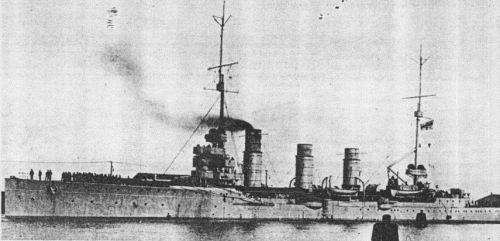

Pillau 1917
| Name | No | Yard No | Builder | Laid down | Launched | Comp | Fate |
| Pillau (ex-Муравьёв-Амурский [Muravyov-Amurskiy]) | 893 | Schichau, Danzig | 1913 | 11.4.1914 | 14.12.1914 | discarded 11.1919, to Italy (Bari) | |
| Elbing (ex-Адмирал Невельской [Admiral Nevelskoy]) | 894 | Schichau, Danzig | 1913 | 21.11.1914 | 4.9.1915 | sunk 1.6.1916 |
|
Displacement normal, t |
4390 |
|
Displacement full, t |
5252 |
|
Length, m |
135.3 oa 134.3 wl |
|
Breadth, m |
13.6 |
|
Draught, m |
5.98 deep load |
|
No of shafts |
2 |
|
Machinery |
2 Marine steam turbines, 10 Yarrow boilers |
|
Power, h. p. |
30000 |
|
Max speed, kts |
27.5 |
|
Fuel, t |
coal 620 + oil 580 |
|
Endurance, nm(kts) |
4300(12) |
|
Armour, mm |
deck: 80 - 20, slopes: 40, CT: 75, shields: 50 |
|
Armament |
8 x 1 - 149/42 SK L/45 C/09, 4 x 1 - 52/52 SK L/55 C/03, 2 x 1 - 500 TT, 120 mines |
|
Complement |
442 |
Project history: In 1912 the F Schichau yard at Danzig (Gdansk) won the contracts for two light cruisers for the Russian Navy against strong international competition. According to Russian practice the two units were named Muravyov-Amurskiy and Admiral Nevelskoy when the keels were laid in 1913. When war broke out both units were in the final stages of completion and were taken over by the Imperial German Navy. Originally they were to be armed with Russian weapons: 8 130mm/55 and 4 63mm/55 guns. The merits of arming them with the 10.5cm gun - standard for German light cruisers - were discussed, but eventually they received 15cm guns. They were therefore the first German light cruisers with this more powerful calibre, and were a very desirable reinforcement for the German Scouting Forces.
Ship protection: Protective deck (2 steel layers and 1 Krupp steel layer) above machinery had 80mm flat and 40mm slopes, ship ends were protected by 20mm deck with 40mm slopes. CT had 75mm sides and 50mm roof, guns had 50mm shields.
Modernizations: 1915, both: - 4 x 1 - 52/52; + 2 x 1 - 88/45 SK L/45 C/13
Naval service: Pillau served with the Scouting Forces and went to Italy after the war under the new name Bari. She was sunk in September 1943 near Livorno by US aircraft. Elbing was so badly damaged in a collision with the battleship Posen during the Battle of Jutland that she had to be scuttled 1.6.1916.

Pillau 1917
© Ivan Gogin, 2014